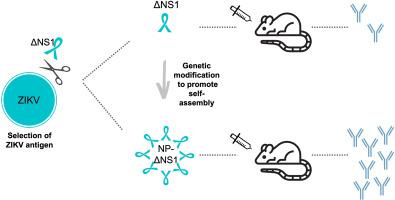Nanomedicine: Nanotechnology, Biology and Medicine ( IF 4.2 ) Pub Date : 2020-11-11 , DOI: 10.1016/j.nano.2020.102334 Marianna Teixeira Pinho Favaro 1 , Monica Josiane Rodrigues-Jesus 1 , Alexia Adrianne Venceslau-Carvalho 1 , Rúbens Prince Dos Santos Alves 1 , Lennon Ramos Pereira 1 , Samuel Santos Pereira 1 , Robert Andreata-Santos 1 , Luís Carlos de Souza Ferreira 1

|
Self-assembling proteins may be generated after the addition of short specific amino acid sequences at both the N- and C-terminal ends. To date, this approach has not been evaluated regarding the impact of self-assembled proteins on the induction of immune responses. In the present study, we report the application of this experimental approach to the immunogenicity of protein antigens by measuring the antibody responses in mice immunized with nanoparticles made with a recombinant form of Zika virus nonstructural protein 1 (∆NS1). The results clearly indicated that ∆NS1-derived nanoparticles (NP-∆NS1) are assembled into a 3-dimensional structure with a high degree of multimerization. While ∆NS1 proved to be a weak immunogen, immunization with NP-∆NS1 enhanced subunit vaccines' immunogenicity with improved longevity in vaccinated mice. Thus, immunization with self-assembled antigens (nanovaccines) represents a new and promising strategy to enhance NS1-specific antibodies' induction based on purified recombinant proteins.
中文翻译:

基于自组装非结构蛋白 1 的纳米疫苗可增强针对寨卡病毒的抗体反应
在 N 端和 C 端添加短的特定氨基酸序列后,可以产生自组装蛋白质。迄今为止,尚未评估这种方法关于自组装蛋白对诱导免疫反应的影响。在本研究中,我们报告了这种实验方法在蛋白质抗原免疫原性方面的应用,通过测量用寨卡病毒非结构蛋白 1 (ΔNS1) 重组形式制成的纳米颗粒免疫的小鼠的抗体反应。结果清楚地表明,ΔNS1 衍生的纳米粒子(NP-ΔNS1)被组装成具有高度多聚化的 3 维结构。虽然 ΔNS1 被证明是一种弱免疫原,但用 NP-ΔNS1 免疫增强了亚单位疫苗的免疫原性,并延长了接种小鼠的寿命。因此,使用自组装抗原(纳米疫苗)进行免疫代表了一种新的、有前景的策略,可以增强基于纯化重组蛋白的 NS1 特异性抗体的诱导。











































 京公网安备 11010802027423号
京公网安备 11010802027423号